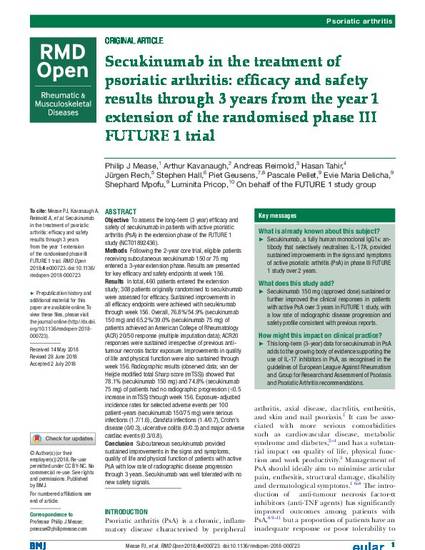
- IL-17A,
- biological therapy,
- psoriatic arthritis,
- radiography,
- secukinumab
Objective: To assess the long-term (3 year) efficacy and safety of secukinumab in patients with active psoriatic arthritis (PsA) in the extension phase of the FUTURE 1 study (NCT01892436).
Methods: Following the 2-year core trial, eligible patients receiving subcutaneous secukinumab 150 or 75 mg entered a 3-year extension phase. Results are presented for key efficacy and safety endpoints at week 156.
Results: In total, 460 patients entered the extension study; 308 patients originally randomised to secukinumab were assessed for efficacy. Sustained improvements in all efficacy endpoints were achieved with secukinumab through week 156. Overall, 76.8%/54.9% (secukinumab 150 mg) and 65.2%/39.0% (secukinumab 75 mg) of patients achieved an American College of Rheumatology (ACR) 20/50 response (multiple imputation data); ACR20 responses were sustained irrespective of previous anti-tumour necrosis factor exposure. Improvements in quality of life and physical function were also sustained through week 156. Radiographic results (observed data; van der Heijde modified total Sharp score (mTSS)) showed that 78.1% (secukinumab 150 mg) and 74.8% (secukinumab 75 mg) of patients had no radiographic progression (≤0.5 increase in mTSS) through week 156. Exposure-adjusted incidence rates for selected adverse events per 100 patient-years (secukinumab 150/75 mg) were serious infections (1.7/1.6),
Conclusion: Subcutaneous secukinumab provided sustained improvements in the signs and symptoms, quality of life and physical function of patients with active PsA with low rate of radiographic disease progression through 3 years. Secukinumab was well tolerated with no new safety signals.
Available at: http://works.bepress.com/philip-mease/402/
